

Uber, Airbnb and consequences of the sharing economy: Research roundup. The leading businesses that are advancing the concept of the “sharing economy” are in many respects no longer insurgents and newcomers.

The size and scale of Uber, Airbnb and several other firms now rival, or even surpass, those of some of the world’s largest businesses in transportation, hospitality and other sectors. As the economic power of these technology-driven firms grows, there continue to be regulatory and policy skirmishes on every possible front, across cities and towns spanning the United States, Europe and beyond. The Economics and Statistics Administration of the U.S. Commerce Department issued a report in June 2016 that attempts to define and map out the contours of this emerging business sector, labeling its participants “digital matching firms.”
That report defines this sector through the four following characteristics: Join the Sharing Cities Network. From Mira Luna, Neal Gorenflo, and team Shareable.
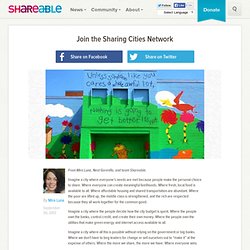
Imagine a city where everyone’s needs are met because people make the personal choice to share. Where everyone can create meaningful livelihoods. Where fresh, local food is available to all. Where affordable housing and shared transportation are abundant. Sharing in your Neighbourhood. Borrow the things you need from people in your neighborhood. Nextdoor: Join the free private social network for your neighborhood. NeighborGoods. Landshare - connecting growers to people with land to share. Yerdle - why shop when you can share? - yerdle. Getaround - Peer-to-peer car sharing and local car rental.
How to Start a Tool Library. It might seem a little risky to lend out a bunch of power tools to those who probably don’t know how to use them.

After all, tools can be dangerous, people can be idiots, and we live in an exceptionally litigious society. For some strange but very understandable reason, those concerns alone have been more than enough to effectively end many community tool libraries before they even start. Learn More. In August 2012 the Center for a New American Dream presented a free webinar about how to start up a new tool library in your community.
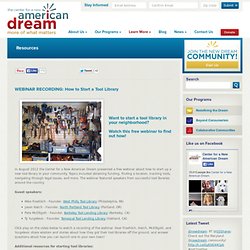
Topics included obtaining funding, finding a location, tracking tools, navigating through legal issues, and more. The webinar featured speakers from successful tool libraries around the country. Guest speakers: Mike Froehlich - Founder, West Philly Tool Library (Philadelphia, PA)Jason Hatch - Founder, North Portland Tool Library (Portland, OR)Pete McElligott - Founder, Berkeley Tool Lending Library (Berkeley, CA)Ty Yurgelevic - Founder, Temescal Tool Lending Library (Oakland, CA) Click play on the video below to watch a recording of the webinar. Additional resources for starting tool libraries: Video length: Approx. 1 hour.
Repair Café (English) The Freecycle Network. Study Reveals Big Opportunities in the Sharing Economy. Latitude and Shareable Magazine recently released the findings of The New Sharing Economy study, which uncovered new opportunities for entrepreneurs, investors, and established companies in the emerging sharing economy.

Top Opportunity Areas for New Sharing Services. The New Sharing Economy study surveyed 537 participants for their current engagement and future interest in sharing across industry categories. Based on this data, the top opportunity areas for new service offerings were interpreted as those with both high latent demand and low market saturation: time, household goods, automobiles, money, and living space.
Infographic excerpted from The New Sharing Economy study report. Download in full here. Time is money. What All Businesses Can Learn from The New Sharing Economy. Image credit: D'Arcy Norman Build brand loyalty and generate more actionable marketing data through sharing-based offerings. Rachel Botsman: The case for collaborative consumption. Access vs. Ownership in ‘Collaborative Consumption’
New rental markets are popping up all over the place, as detailed by a recent Wall Street Journal article.
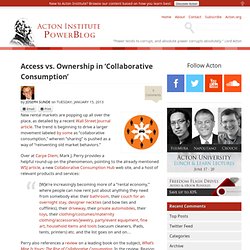
The trend is beginning to drive a larger movement labeled by some as “collaborative consumption,” wherein “sharing” is pushed as a way of “reinventing old market behaviors.” It's Time to Go Big: A Vision for the Sharing Economy. The sharing economy is in a regulatory crisis.
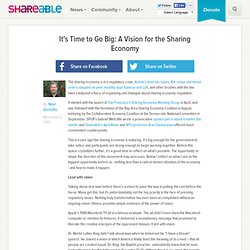
Airbnb’s hotel tax issues, the cease and desist orders slapped on peer mobility apps Sidecar and Lyft, and other brushes with the law have catalyzed a flurry of organizing and dialogue about sharing economy regulation. It started with the launch of San Francisco’s Sharing Economy Working Group in April, and was followed with the formation of the Bay Area Sharing Economy Coalition in August, lobbying by the Collaborative Economy Coalition at the Democratic National Convention in September. SPUR’s Gabriel Metcalfe wrote a provocative opinion piece about it earlier this month, and Shareable’s April Rinne and NYU professor Arun Sundararjan offered much commented counterpoints. This is a sure sign the sharing economy is maturing. It’s big enough for the government to take notice and participants are strong enough to begin working together.
Lead with vision Apple’s 1984 Macintosh TV ad is a famous example. Dr. Offer the vision This is good. The Sharing Solution » 20 Questions to Discuss When You Share. When you sit down to discuss the details of a sharing arrangement, here is a list of 20 categories of questions to discuss.
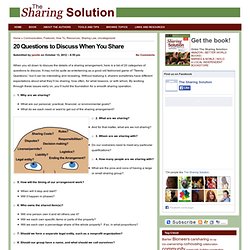
It may not be quite as entertaining as a good old fashioned game of “Twenty Questions,” but it can be interesting and revealing. Without realizing it, sharers sometimes have different expectations about what they’ll be sharing, how often, for what reasons, or with whom. By working through these issues early on, you’ll build the foundation for a smooth sharing operation. □ 1.